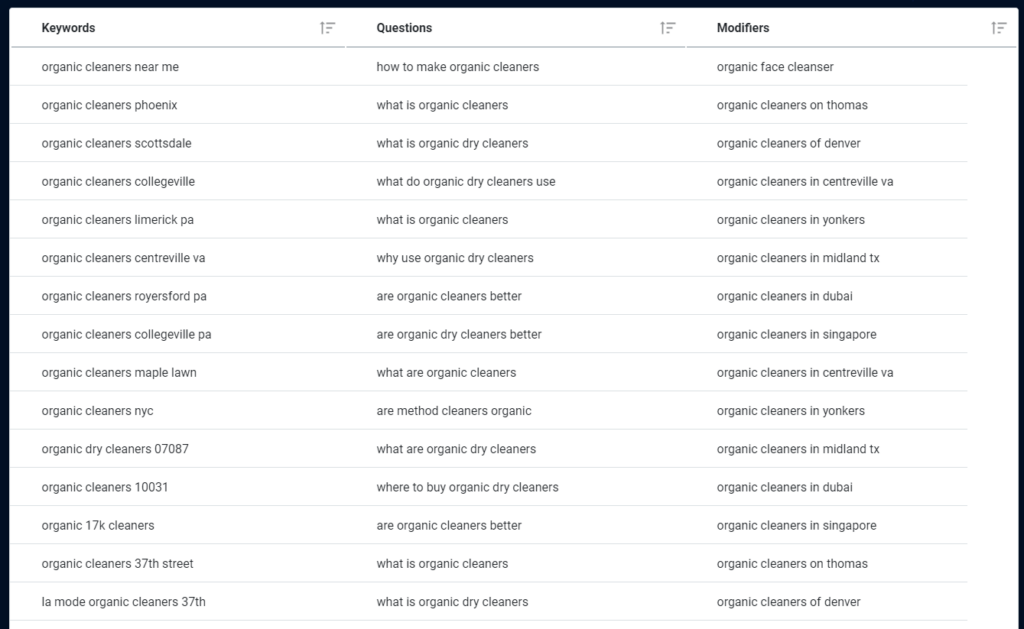-
 9 min. read
9 min. read
-
 Macy Storm
Macy Storm Senior Content Creator
Senior Content Creator
- Macy is a marketing writer with over five years of experience creating content for dozens of industries including food and beverage, home services, and education. She also specializes in creating SEO and PPC content. Her work has been featured by Search Engine Journal, HubSpot, Entrepreneur, Clutch, and more. In her free time, Macy enjoys trying new crafts and reading comic books.
Are you looking to improve your search engine optimization (SEO) campaign or reach more valuable leads with your pay-per-click (PPC) advertising campaign? If so, you need to start using niche keywords, which will help you drive qualified traffic and interested leads to your business. But wait, what are niche keywords, and how do you find them?
On this page, we’ll dive into what niche keywords are and provide you with four steps for finding the right niche keywords. To learn more about niche keywords and other useful marketing strategies, subscribe to Revenue Weekly!
What are niche keywords?
Niche keywords are exceedingly specific keywords that focus on a particular area or industry. These keywords are long-tail keywords, which contain three or more words.
Niche keywords tend to have a lower search volume because they are specific, but they drive more qualified traffic to your website.
What is an example of a niche keyword?
Let’s say you own an organic cleaning company. Some great niche keywords for your business would be “non-toxic cleaning products for homeowners” or “eco-friendly commercial cleaning products.” These are highly specific keywords and appeal to small groups within the larger group of people interested in organic cleaning products. When you look at a keyword like “eco-friendly commercial cleaning products,” you know that the everyday person isn’t using that search term.
Only people looking to buy eco-friendly, commercial-grade cleaning products will use that niche keyword.
Where do I use niche keywords?
Niche keywords play a critical role in your SEO and PPC campaigns. With SEO, these keywords help you rank in relevant search results. For example, if you created a page focused on eco-friendly commercial cleaning products and integrated the term thoroughly, like in your headings and paragraphs, you’d be more likely to rank in search results for that term.
With PPC, choosing niche keywords allows you to reach relevant leads and drive them to your business. When you decide to bid on a niche keyword, you help your ad appear in search results in front of the most qualified leads.
Why are niche keywords important to my business?
Now that you have the answer to “What are niche keywords?” you may wonder why niche keywords are relevant to your business. Why are these keywords more important than broad, popular key terms that have tons of search volume?
Conducting niche keyword research is vital because niche keywords are relevant leads to your company.
If someone searches “organic cleaning,” it’s challenging to know the intent behind the search.
Do they want to find an organic cleaning company? Are they looking for more information about organic cleaning? Or do they need to buy organic cleaning products?
With a generic, short-tail keyword, it’s challenging knowing. Niche keywords, however, have a clear search intent. If someone searches “non-toxic cleaning products for homeowners,” you know the searcher is a homeowner looking for non-toxic products for their home.
Targeting and ranking in search results for that keyword allows your business to reach your target audience. Additionally, niche keywords are easier to rank for in search results. They have less competition and more relevant leads than short-tail keywords, which makes niche keywords valuable.
How to find the right niche keywords for your business
Now that we answered, “What are niche keywords?” it’s time to focus on how to find the right ones.
Check out these four steps for finding and maintaining relevant niche keywords for your company:
1. Define your niche
Before you conduct niche keyword research, identify your niche. You won’t find relevant keywords for your business if you haven’t established your niche. So, how do you discover your niche?
With these three steps:
- Establish your industry: This step may seem obvious, but the first step is to establish your industry. If you’re an organic cleaning company, for example, you fall into the cleaning industry.
- Evaluate your products or services: Your products or services determine your niche. When you know what you offer, you know what market niche you occupy. An organic cleaning company, for example, will work in the organic sector of the cleaning industry.
- Identify the problems you solve: Whether you offer products or services, you solve a problem for your clients. An organic cleaning company, for instance, helps people who don’t want to use toxic cleaners. When you identify your market’s problems, you can find your niche.
These three steps will help you discover your niche. By establishing your niche, you’ll find the best niche keywords for your business.
2. Conduct keyword research to find the best niche keywords
Once you determine your niche, you can start conducting keyword research to discover relevant terms for your business. Niche keyword research helps you generate a list of valuable phrases for your website and paid ad campaigns. Find a useful keyword research tool to start researching keywords.
Some examples of niche keyword research tools include KeywordsFX and Keyword Tool. You can compare your options and see which one you like best. We’ve put together a video to make your keyword tool decision as simple as possible.
Once you establish which tool you want to use, start searching.
You can use short-tail keywords to help you find long-tail, niche keywords. For example, let’s look at the results when searching for “organic cleaners.”  With this example, you can see some niche keywords like “organic drain cleaners” and “organic oven cleaners.” If you offer these products, you could use these niche keywords to reach people looking for these items. When you conduct niche keyword research, compile a list of keywords you think will be relevant to your business.
With this example, you can see some niche keywords like “organic drain cleaners” and “organic oven cleaners.” If you offer these products, you could use these niche keywords to reach people looking for these items. When you conduct niche keyword research, compile a list of keywords you think will be relevant to your business.
You don’t need to pull every keyword off the list. Focus on the ones that fit your business and have the most potential to drive high-quality leads and traffic.
3. Analyze your keyword list
Once you have a list of keywords, analyze them to see which ones to prioritize. You don’t need to use your entire keyword list. The important part is that you have a list of potential keywords that are relevant to your business, so you’re aware of what terms are out there and how they perform.
You can start by analyzing each keyword’s monthly search volume with a tool like Ubersuggest — or how often people search for that term. With niche keywords, you’re going to see a lower keyword volume, but it’s still important to see how these long-tail keywords stack up against one another.  If you’re looking to use these niche keywords for SEO, you’ll want to look at the keyword difficulty.
If you’re looking to use these niche keywords for SEO, you’ll want to look at the keyword difficulty.
The name for this will vary, depending on the tool. Some tools call it SEO difficulty, keyword difficulty, or competition.  No matter what you call it, this metric focuses on how difficult it will be to rank for a keyword.
No matter what you call it, this metric focuses on how difficult it will be to rank for a keyword.
Keyword difficulty operates on a scale of 0-100, with 0 being low difficulty and 100 being great difficulty. This metric is critical to look at when you’re trying to rank in search results because it helps you understand if it will be easy or challenging. If you’re looking to use niche keywords for a PPC campaign, you’ll want to pay special attention to the cost-per-click (CPC) section.
This section tells you the average amount that companies pay when someone clicks on their ad for that keyword.  This information helps you determine which keywords are suitable for an advertising campaign. It will also guide you when setting bids for your PPC ads.
This information helps you determine which keywords are suitable for an advertising campaign. It will also guide you when setting bids for your PPC ads.
By analyzing this information, you can determine which keywords fit your campaign and goals best.
4. Monitor and adapt your niche keywords as necessary
Once you have the right keywords for your pages and integrate them, your work continues. It’s vital that you consistently monitor your keywords and their performance to see if they’re driving valuable results for your business. When you add keywords to your SEO campaign, you need to monitor their performance for a few months.
You won’t rank highly for a keyword immediately, so you need to keep an eye on how your pages rank over time. If you’ve been monitoring a page for a few months, and it’s not ranking well, you may need to optimize the page more. You can have an excellent keyword for your page, but if it’s not ranking well, you may need to do more link building or optimize the page content to fit search results better.
As for PPC, you may find that the keywords for your ad are too competitive. Instead of wasting resources and time trying to rank for the keyword, you can go back to your initial keyword research and find a different keyword for the page. For example, if you’re trying to run an ad for “organic cleaners,” you may find the keyword too competitive, resulting in not enough clicks for the amount you’re paying.
Instead, you go back to the keyword research board and choose a longer keyword, like “organic cleaners for homeowners.” As you monitor your ad’s performance, you see it’s driving more clicks and conversions. Because you took the time to monitor your campaign, you found out which keywords worked best. By consistently monitoring keyword performance, you’ll find the best niche keywords for your business.
93% of WebFX customers are extremely satisfied with their digital marketing results.
“Working with WebFX, everything is very organized and strategic. We’re only a year into our partnership, and our expectations have definitely been met.”
View More Client Testimonials

Start ranking for niche keywords today
If you want to start attracting more interested leads to your business, you must invest in finding the right niche keywords.
The best niche keywords will help you reach people looking for your products or services. Aren’t sure where to start with niche keywords? Contact us online or call us today at 888-601-5359 to speak with a strategist about our SEO services.
-
 Macy is a marketing writer with over five years of experience creating content for dozens of industries including food and beverage, home services, and education. She also specializes in creating SEO and PPC content. Her work has been featured by Search Engine Journal, HubSpot, Entrepreneur, Clutch, and more. In her free time, Macy enjoys trying new crafts and reading comic books.
Macy is a marketing writer with over five years of experience creating content for dozens of industries including food and beverage, home services, and education. She also specializes in creating SEO and PPC content. Her work has been featured by Search Engine Journal, HubSpot, Entrepreneur, Clutch, and more. In her free time, Macy enjoys trying new crafts and reading comic books. -

WebFX is a full-service marketing agency with 1,100+ client reviews and a 4.9-star rating on Clutch! Find out how our expert team and revenue-accelerating tech can drive results for you! Learn more
Try our free Marketing Calculator
Craft a tailored online marketing strategy! Utilize our free Internet marketing calculator for a custom plan based on your location, reach, timeframe, and budget.
Plan Your Marketing Budget

Maximize Your Marketing ROI
Claim your free eBook packed with proven strategies to boost your marketing efforts.
Get the GuideTry our free Marketing Calculator
Craft a tailored online marketing strategy! Utilize our free Internet marketing calculator for a custom plan based on your location, reach, timeframe, and budget.
Plan Your Marketing Budget




